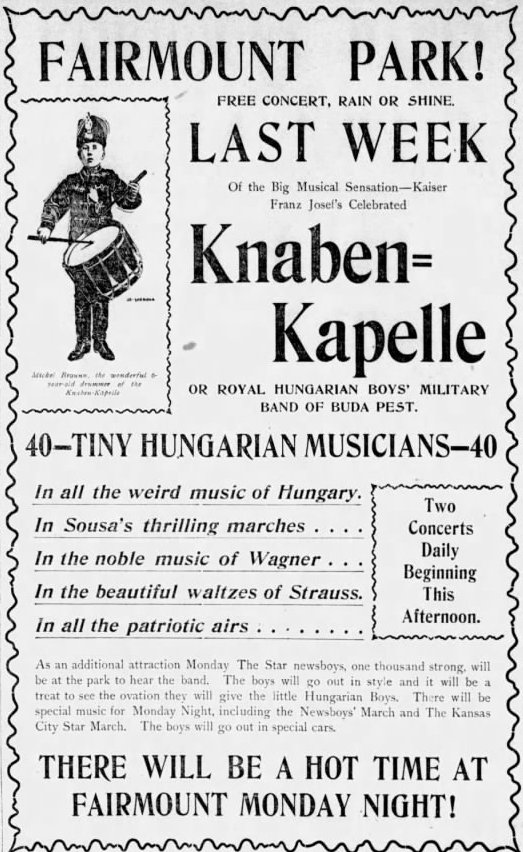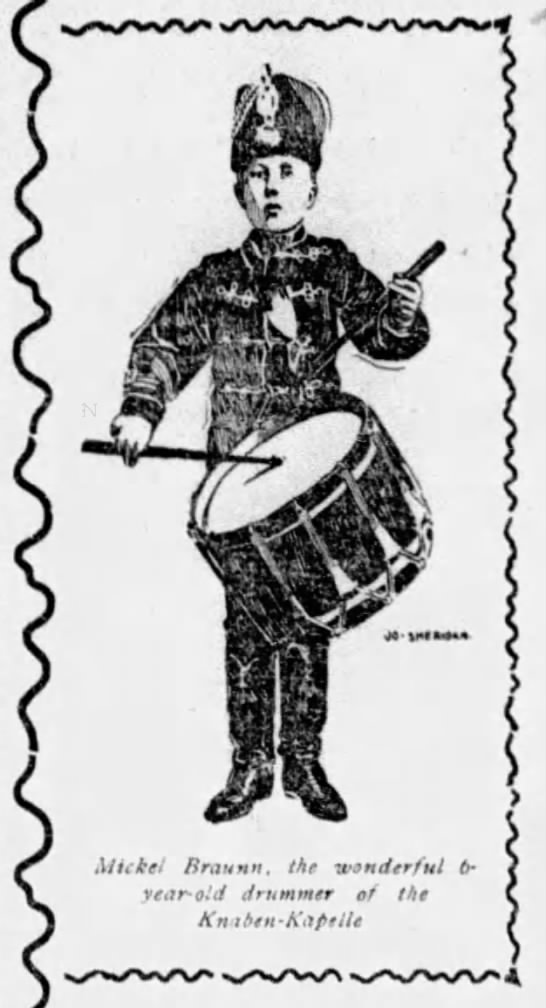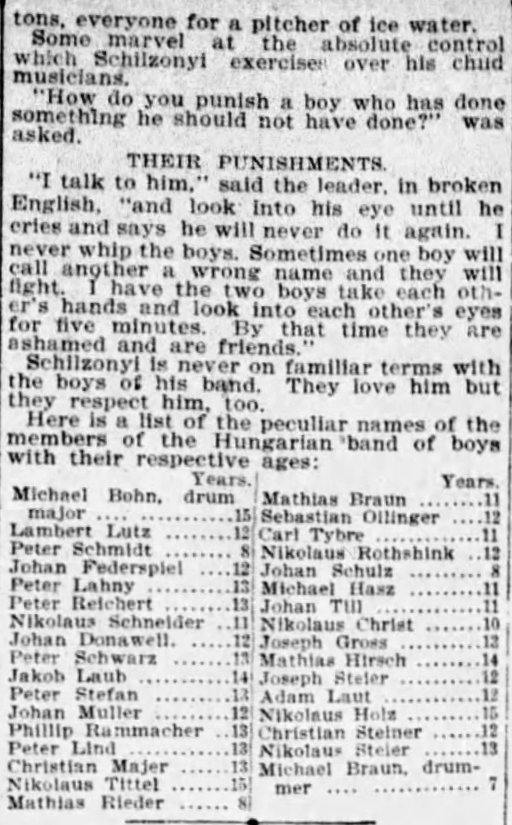WITH THE HUNGARIAN BOYS. THE AUSTRIAN BAND AT FAIRMOUNT IS AN INTERESTING STUDY.
Little Chaps, Out of Whom All Childish Tendencies Have Been Drilled - Eating and Sleeping by Orders - Their Dally Routine - Their Punishments
The Kansas City Star, Kansas City, Missouri. July 24, 1898
Published at DVHH.org 29 May 2020 by Jody McKim
Pharr
 |
"Austehen!" (Get
Up!)
Thirty-two boy musicians from Hungary moved uneasily In
their beds at the Fairmount Park Hotel, opened their eyes and rubbed them with their fists, popped out of bed and began pulling on their clothes. There were four boys to one bedroom, but none of them threw pillows or tried to hide a garment of another. Everyone arrayed himself in his fatigue suit with as much gravity and precision as though the destiny of the universe depended upon the act. In thirty minutes exactly, the thirty-two boys, having scrubbed and brushed and combed, emerged from their chambers, descended promptly to the sidewalk in front of the hotel and took their proper and accustomed places in the company formation with the other youthful members of the band. All wore loose blue coats, white duck trousers and scarlet caps. They stood erect and motionless, without the slightest turn of the
head, not a smile, hardly the quiver of an eyelash. The little soldiers were waiting for the command to march to breakfast.
SOMETHING OF THE BOYS.
There are thirty-three boys, their ages between 6 and 15 years, who play on instruments made for men the classic music of Wagner and Liszt and Beethoven; and this after only three years' practice together; They are thirty-three hearty, healthy, happy boys, some of them so boisterous by nature that even as tiny children their fathers and mothers could not curb them. Now they are gentle, obedient, calm in their happiness and expert musicians. Discipline, vigorous and unrelenting with scarcely a moment's relaxation from the mornings awakening to the nights sleep, binds the children to their art.
There is a definite period every day for sleeping, for eating, for practicing, for performing and for recreation, and this programme is always enforced with accurate care.
The thirty-three Hungarian boy musicians are taught and led and commanded by
Nikolaus Schilzonyi. Every day he appoints an inspector from among the older boys in the band, and this
inspector reports regularly every hour to Schilzonyi for instructions as to the programme for his companions on that day. The inspector for the day rises one-half-hour before the other boys, and it is he who gives them in German command to "Get up!"
LIKE REGULARS
The boys stand in military array in front of the hotel awaiting the command to march to breakfast. The drum major of the band, Michael Bohn 16 year old,
is always the
captain on the march. At the word from him. the little company steps off in twos or by fours for the cafe of the park. Like old regulars the strange, quiet visaged children occupy the stations at the long tables to which they had been assigned at their first meal. The command given, they sat down in unison, and when the food is brought they fall to, almost keeping time with the clatter of their knives
and forks.
When the Hungarian boys came to America, their instructor had difficulty finding them food that they relished.
They wanted "gulosch," of course,
because that is a favorite dish in their native country, but the cooks would not concoct the potpourri of viands and relishes. The boys like ham and bacon, veal chops and soups, but they wouldn't touch beef The American vegetable they made palatable
with plenty of vinegar and sugar. They were fond of fresh sweet corn and watermelons, but they had never tasted ice cream until they reached the United States and the boys didn't like the frozen stuff. They were puzzled how to eat it. Some of them tried seasoning of vinegar and sugar The Hungarians have now by continued trails acquired a slight taste for frozen cream. They have wine and coffee at their breakfasts, dinners and suppers and sometimes they drink a little beer.
QUIET AT THEIR PLAY.
"Antreten!"
The thirty-three rise from their long table, step from the cafe and resume the military formation of a company. When a half hour's recreation is proclaimed, the Hungarian boys do not shout and run and push one another and
frolic wildly as American boys, and even American men (witness the volunteers) would do. They speak to one another in pleasant, subdued tones and play German base ball until their director calls them to practice music.
During two hours the musical drill is kept up, and then the instruments are laid away in their places and the children "fall in" for the hotel. They seldom walk, eve short distances, without becoming little soldiers and marching at "attention." At the hotel they wash themselves thoroughly before they drill to dinner.
There is another striking difference between these strange, musical children, and the boys of their age in the United States. The little Hungarians are like cleanly kittens: they wash themselves
at every opportunity. When they go to a hotel in a strange city they
celebrate by scrubbing their hand and faces.
ALL DONE BY COMMAND.
There is the same military precision at dinner. In the afternoon an hour of leisure is given, two hours of instruction under
Michael Nussbaum, their school teacher,
another hour's concert in the pavilion, leisure until supper, concert and then bed about 11 o'clock.
The little fellows march to their room at the same minute and the undress and go to sleep without disturbance.
"When 1 go to a city hotel," said C. E. Bray, the business manager, "and request rooms for thirty -three boys under 16 years of age, there is usually a prompt refusal.
"Thirty-three boys!" the hotel man has visions of sleepless nights for his guests and torn sheets and scattered pillow slips. It always requires persuasion to secure lodging
for the boys."
These serious children are pupils from the government military musical school of Austria, situated at Billed, in Southern Hungary. Boys are trained there for the bands of the Austrian army and their instruction begins usually when they are 4 or 5 years old. From that time until they have attained the age of 16, when they take their places
in the Austrian military bands, the children are under discipline that is almost severe. Hearing of this school Gustav Walters of the Orpheum circuit, carried out the
idea of a European and American tour, the little musicians to be under the immediate charge of one of their instructors, Schilzonyi.
They set out from the school in May, 1897, and they will return to Hungary next spring.
Their leave of absence from the Austrian government was two years.
BATHING BY FOURS.
Every act of the children' lives is defined by the military code. At the hotels the boys are taken to the bath tubs in squads of four and allowed ten minutes for bathing. They are given half an hour every other day at Fairmount for a plunge in the lake. When they pass from the hotel to the depot every little musician carries his own instrument and always on the left shoulder.
One night last week the night clerk of the Fairmount hotel heard simultaneously bells from twenty rooms. He responded with all possible alacrity and found that with unity of purpose the Hungarian boys had arisen and touched the. electric buttons,
everyone for a pitcher of ice water.
Some marvel at the absolute control which
Schilzonyi
exercises over his child musicians. "How do you punish a boy who has done something he should not have done?" was asked.
THEIR PUNISHMENTS.
"I talk to him, said the
leader. In broken English, and look into his eye until he cries and says he will never do it again. I never whip the boys. Sometimes one boy will call another a wrong name and they will fight. I have the two boys take each other's hands and look into each other eye for five minutes. My that time they are ashamed and are friends."
Schilzonyi is never on familiar terms with the boys of
the band. They love him but they respect him, too.
Here is a list of the peculiar names of the member of the Hungarian band of boys with their respective ages:
 |
Michael Bohn, 15, drum major
Lambert Lutz, 12
Peter Schmidt, 8
Johan Federspiel, 12
Peter Lahny, 13
Peter Reichert, 13
Nikolaus Schneider, 11
Johan Donawell, 12
Peter Schwarz, 13
Jakob Laub, 14
Peter Stefan, 13
Johan Muller, 12
Phillip Rammacher, 13
Peter Lind, 13
Christian Majer, 13
Nikolaus Tittel, 15
Mathias Rieder, 8 |
Mathias Braun, 11
Sebastian Ollinger, 12
Carl Tybre, 11
Nikolaus Rothshink, 12
Johan Schulz, 8
Michael Hasz, 11
Johan Till, 11
Nikolaus Christ, 10
Joseph Gross, 13
Mathias Hirsch, 14
Joseph Steier, 12
Adam Laut, 12
Nikolaus Holz, 15
Christian Steiner, 12
Nikolaus Steier, 13
Michael Braun, 7, drummer |


|